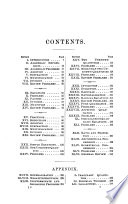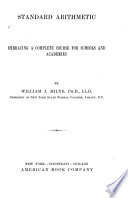 | Daniel Barnard Hagar - Algebra - 1873 - 278 pages
...are called Extremes, and all the other terms are called Arithmetical Means. Theorem I. 346. The last term of an arithmetical progression is equal to the first term plus the product of the common difference by the number of terms less one. Let the terms of the progression... | |
 | William James Milne - Arithmetic - 1877 - 402 pages
...seventh term will be equal to the first term plus six times the common difference, which is 15. RULE.— Any term, of an arithmetical progression is equal to the first term, increased by the common difference multiplied by a number one less than the number of terms. 22 2.... | |
 | William James Milne - Arithmetic - 1892 - 440 pages
...seventh term will be equal to the first term plus six times the common difference, which is 15. RULE. — Any term of an arithmetical progression is equal to the first term, increased or diminished by the common difference multiplied by a number one less than the number of... | |
 | Gustavus Sylvester Kimball - Business mathematics - 1911 - 444 pages
...term of an arithmetical series is 5 and the common difference is 3, what is the 15th term? 686. Rule. Any term of an arithmetical progression is equal to the first term, increased or diminished by the common difference multiplied by a number one less than the number of... | |
 | George Hervey Hallett, Robert Franklin Anderson - Algebra - 1917 - 432 pages
...a represents the first term, and d the difference. 280. The general term. By inspection it is seen that any term of an arithmetical progression is equal to the first term plus a multiple of the difference. Thus, in the general form it is obvious that the coefficient of d in... | |
| |